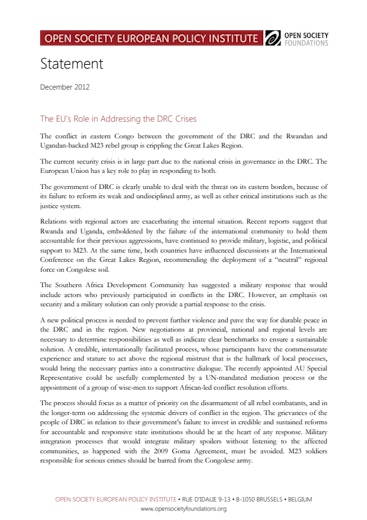A Fresh Start for U.S. Policy in Central Africa
By Sarah Pray
Former U.S. Senator Russ Feingold’s appointment as the U.S. Special Representative to the African Great Lakes and the Democratic Republic of the Congo could be a harbinger of good news for this troubled region, which has been plagued by violence and conflict for years. Feingold has the chance to build on some recent positive developments.
In February, 11 Central African nations signed the Peace, Security, and Cooperation Framework, which outlines a path toward stabilizing the Great Lakes region. It calls for security sector and institutional reform in Congo and demands that Congo’s neighbors stop destabilizing the country. A month later, United Nations Secretary General Ban Ki-Moon appointed former Irish president Mary Robinson as the UN Special Envoy to the Great Lakes. And, in May, World Bank president Jim Kim pledged $1 billion in development funds to support the Framework Agreement and its implementation.
The uptick in policymaking is a direct result of the rebel group M23’s insurgency in Congo last year when hundreds died and thousands were displaced. The UN Group of Experts released a report in the summer of 2012, which showed direct Rwandan government support for the M23, underscoring the need for serious and concerted international engagement. But if the world’s major powers want political stability and an end to the violence, their response to the crisis has to be about more than M23 and eastern Congo.
The implementation of the Framework’s policy prescriptions and the appointment of two high-level envoys suggest that the countries in the region and the international community are ready to address the root causes of the problems in Congo and the region. For years, diplomats and analysts from the U.S. to the UN have talked at length about the need for security sector and political reform in Congo and economic development in the region. But now the U.S., UN, and the countries in the region can turn talk into action. Indeed, the real test will be when the bright light of international attention on M23 fades and the real diplomatic and development work begins.
Feingold and Robinson, in a way, have a fresh start.
The first thing they must do is to ensure Congo’s neighbors stop meddling in Congo’s affairs. Specifically, they need to deliver a tough message to the Rwandan government and tell it to stop interfering and destabilizing its much larger neighbor. The media and other observers on the ground in the region report that Rwanda continues to support M23, despite the pressure exerted by the international community. A peace deal likely will not be reached if Congo’s neighbors continue to interfere and foment rebellion in the country.
Second, they need to make Congolese governance a significant part of their mandate. They must get Congo to undertake comprehensive—rather than piecemeal reform as it has done in the past—security sector reform. Furthermore, the Congolese government must follow through on its promises to reform its electoral system and the electoral commission and start planning for local and provincial elections next year. Finally, it must deliver on much needed institutional and administrative reforms in the justice sector and public administration and end the widespread corruption.
U.S. policy toward Congo was at its worst in 2011 during the Congolese presidential elections. The U.S. government failed to denounce a fraudulent electoral process. As a result, the current government lacks legitimacy in the eyes of its citizens, worsening its current problems. Without a legitimate Congolese government, peace will remain unlikely.
In a letter sent today, a number of U.S. and Congo-based analysts urged Senator Feingold to prioritize building DRC’s democratic institutions and the implementation of the Framework Agreement. The fate of Congo rests with the Congolese, but it is our hope that Feingold, together with Robinson and others, can help bring lasting peace and security to eastern Congo as well as the entire Great Lakes region.

Until November 2021, Sarah Pray was the director of advocacy for the Open Society Economic Justice Program.


